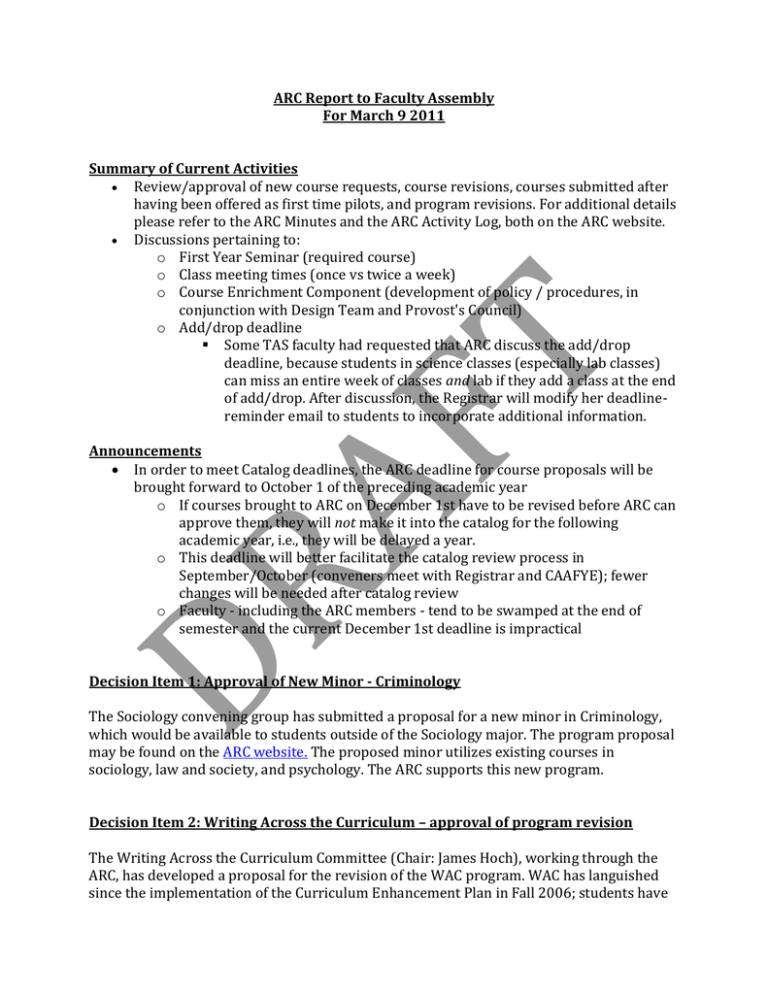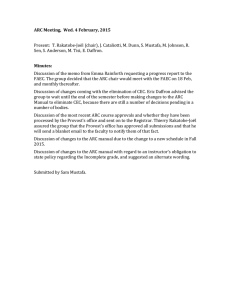Review/approval of new course requests, course revisions, courses submitted after
advertisement

ARC Report to Faculty Assembly For March 9 2011 Summary of Current Activities Review/approval of new course requests, course revisions, courses submitted after having been offered as first time pilots, and program revisions. For additional details please refer to the ARC Minutes and the ARC Activity Log, both on the ARC website. Discussions pertaining to: o First Year Seminar (required course) o Class meeting times (once vs twice a week) o Course Enrichment Component (development of policy / procedures, in conjunction with Design Team and Provost's Council) o Add/drop deadline Some TAS faculty had requested that ARC discuss the add/drop deadline, because students in science classes (especially lab classes) can miss an entire week of classes and lab if they add a class at the end of add/drop. After discussion, the Registrar will modify her deadlinereminder email to students to incorporate additional information. Announcements In order to meet Catalog deadlines, the ARC deadline for course proposals will be brought forward to October 1 of the preceding academic year o If courses brought to ARC on December 1st have to be revised before ARC can approve them, they will not make it into the catalog for the following academic year, i.e., they will be delayed a year. o This deadline will better facilitate the catalog review process in September/October (conveners meet with Registrar and CAAFYE); fewer changes will be needed after catalog review o Faculty - including the ARC members - tend to be swamped at the end of semester and the current December 1st deadline is impractical Decision Item 1: Approval of New Minor - Criminology The Sociology convening group has submitted a proposal for a new minor in Criminology, which would be available to students outside of the Sociology major. The program proposal may be found on the ARC website. The proposed minor utilizes existing courses in sociology, law and society, and psychology. The ARC supports this new program. Decision Item 2: Writing Across the Curriculum – approval of program revision The Writing Across the Curriculum Committee (Chair: James Hoch), working through the ARC, has developed a proposal for the revision of the WAC program. WAC has languished since the implementation of the Curriculum Enhancement Plan in Fall 2006; students have not been held to the requirements of the program (completion of four Writing Intensive [WI] courses), and many courses that were WI before CEP were lacking that designation in Banner. Since September 2010, convening groups have worked to review the WI status of their courses, ensuring that the WI designation is on the correct courses; ARC has approved requests to add WI status to 19 existing courses (including capstone courses in 2 majors). The WAC committee has proposed a number of changes to WAC pertaining to the structure of the program, its oversight, and implementation. The two key pieces are the restructuring of the program into two sections (WAC in General Education and WAC in the Schools), and the establishment of a standing committee that will report to ARC and FA. The ARC commends the committee on the report (which can be found on the ARC website) and its recommendations, and recommends the acceptance of the report and the adoption of its recommendations. Decision Item 3: Adoption of Draft Manual of Policies and Procedures for Online Learning As announced in Unit Councils, the ARC has created a draft set of policies and procedures for online courses and programs. The draft may be found on the ARC website. Upon approval by the Faculty Assembly, the ARC will incorporate this document into the ARC Academic and Curricular Guidelines Manual for Fall 2011. Currently, Ramapo College offers online courses in winter and summer sessions (with a handful of online courses in Fall and Spring). However, there are few consistent procedures with regard to these courses. In this document, which used similar manuals from several institutions as a basis, the ARC has attempted to create a coherent set of procedures to guide our online course offerings. Additional considerations regarding faculty workload our outside the ARC's purview and will need to be discussed by other bodies. This manual discusses two types of courses: fully online courses (termed Online courses), and courses which combine a significant amount of online work with some face to face meeting time (termed Hybrid courses; these courses might, for instance, meet 3-4 times a semester, or perhaps meet once a week for 90 minutes, half the amount of time of a face-toface class). Discussion Item: Policy and Procedures for CEC The CEC is an aspect of the curriculum that went into effect on September 1, 2006. Formerly referred to as the "Experiential Component", this five-hour component is required of all regularly-scheduled 4-credit undergraduate courses, and should enhance student learning and be integrated into the course. The types of experiences suggested in the original definition of the component1 do not necessarily meet the faculty's definition of experiential 1 Memorandum of Understanding between AFT Local 2274 and RCNJ, 11/16/2006 learning2; thus, the component is currently referred to as the Course Enrichment Component (or CEC)3. The Middle States Commission on Higher Education requires us to "[document] the implementation of policies and procedures to assure that the experiential learning components of all courses are conducted with rigor appropriate to the programs offered and are designed, delivered and evaluated to foster a coherent student learning experience". The 'Design Team" was charged in August 2010 with the tasks of: (1) surveying faculty and students regarding CEC implementation, concerns and recommendations, distributing the survey results and holding open forums; (2) recommending policies and procedures to assure that the CEC of all courses are conducted with rigor appropriate to the programs offered and are designed, delivered and evaluated to foster a coherent student learning experience; (3) recommend overarching student learning goals relevant to all CECs (in consultation with faculty and GECCo); (4) engage the campus community in a dialog revolving around CEC and its potential as a high impact learning experience4. The charge specifies that policies and procedures for CEC need to be determined by the end of the Spring 2011 semester. The ARC, in consultation with the Design Team, has developed a Policy and series of Procedures surrounding the implementation and incorporation of the CEC in our courses. The Design Team is in the process of determining goals and student learning outcomes for the CEC. The ARC requests feedback from faculty by March 21st. Feedback will be compiled and posted on the ARC website, and ARC will bring a revised document to the Faculty Assembly on March 23rd. 2 Experiential Learning Task Force Report, 3/28/2007 ARC Academic and Curricular Guidelines Manual, 2010 4 modified from 'Design Team Charge, 08/31/2010' (http://ww2.ramapo.edu/administration/provosthome/designteam.aspx) 3

